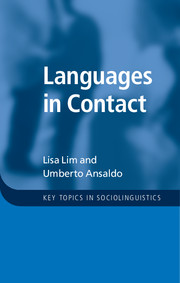Book contents
- Frontmatter
- Contents
- List of figures
- List of tables
- Preface
- Acknowledgements
- List of abbreviations
- 1 Perspectives on contact
- 2 Contact and code choice
- 3 Contact and creole formation
- 4 Contact and language evolution
- 5 Contact and ecology
- 6 Contact and shift
- 7 Contact and globalisation
- 8 Reflections and future directions
- References
- Index
6 - Contact and shift
Published online by Cambridge University Press: 05 November 2015
- Frontmatter
- Contents
- List of figures
- List of tables
- Preface
- Acknowledgements
- List of abbreviations
- 1 Perspectives on contact
- 2 Contact and code choice
- 3 Contact and creole formation
- 4 Contact and language evolution
- 5 Contact and ecology
- 6 Contact and shift
- 7 Contact and globalisation
- 8 Reflections and future directions
- References
- Index
Summary
INTRODUCTION
There are good reasons to include the field of language shift and endangerment in a study of languages in contact. For one thing, language shift and language endangerment are themselves consequences of contact. Language shift, which is the replacement of one language by another as a primary means of communication and socialisation within a community, is a common response of communities in the face of competition from a regionally and socially more powerful language. In more extreme cases, language shift can lead to language endangerment and – eventually – obsolescence, when a language is no longer used by any community in the world. Second, in the course of shift and endangerment, outcomes of contact can still be observed, which are almost always illuminating for understanding the factors at play in such contact situations.
Scholars usually date the beginnings of formal identification and study of language maintenance and shift to Joshua Fishman's (1964) work. Since then, and especially in the last two decades, this field of scholarship – particularly for endangered languages – has seen immense growth. A few significant funding bodies have been supporting a large number of projects documenting endangered languages, resulting not only in the documentation of many hitherto unknown languages but also in phenomenal growth in the field in scholarship, methodology, technical expertise and equipment, as well as attention to issues of ethics.
In the first sections of this chapter, we provide an overview of the essential points and issues to be aware of when engaging with this topic; for full and comprehensive coverage readers are pointed to the volumes mentioned in the list of further reading. We then look in greater detail at the present situation of the Malays of Sri Lanka, an interesting case study for the various sociolinguistic factors that impacted on their choices, leading to situations of maintenance, shift and endangerment. We also return to the issue of identity alignment, addressed in Chapter 4, when a community is faced with choosing to keep or discard languages.
- Type
- Chapter
- Information
- Languages in Contact , pp. 129 - 158Publisher: Cambridge University PressPrint publication year: 2015
- 1
- Cited by



